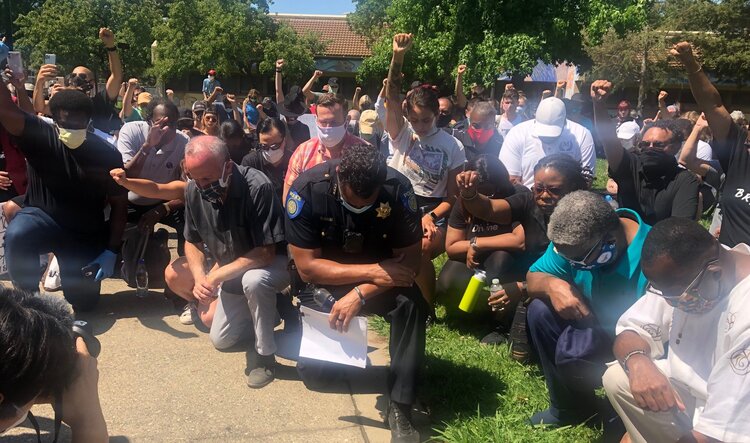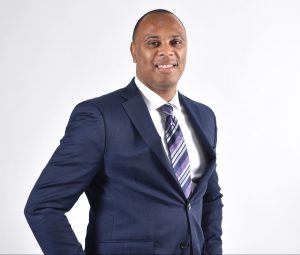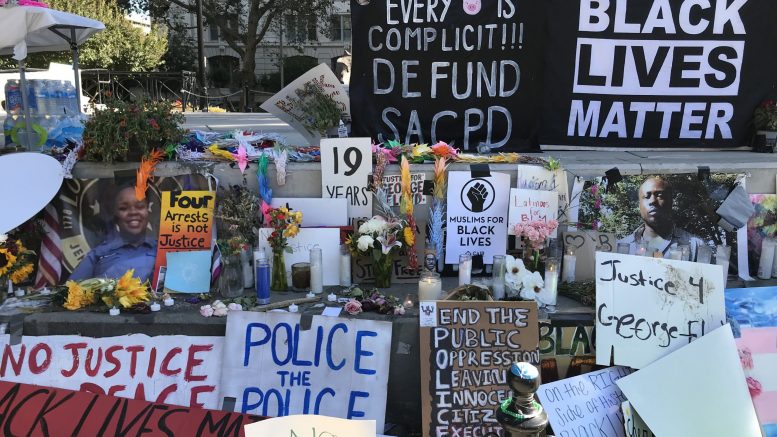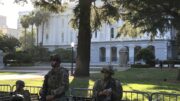Editor’s note: Sacramento’s mayor promises police reforms, but will rank-and-file go along?
After hundreds of protestors staged a die-in near his home Friday evening, Mayor Darrell Steinberg promised real and lasting police reforms in Sacramento.
Calling the demonstration a “powerful and necessary expression of the anger and demand for greater change,” he tweeted: “I embrace the demand and expect to be judged by my actions, not just by my words,” starting with a commitment to work with Police Chief Daniel Hahn and City Council members to build on recent reforms.
But how far city leaders go is not entirely up to them.
As in other cities, the powerful police union will also have a say in what kinds of sweeping changes—if any—will result from the protests over the killing of George Floyd by Minneapolis police.
The Sacramento Police Officers Association has called Floyd’s death “appalling.” “This is not policing. This is a travesty,” union President Timothy Davis said in a statement.
“When officers commit criminal violations, they should be held accountable by the criminal justice system. When fellow officers witness an officer violating their oath and committing a criminal act, they are obligated to intervene,” the statement said.
Davis called for nationwide standards for law enforcement officers and their use of force, but did not commit to any specific changes.
One has already happened. After Gov. Gavin Newsom ordered a statewide stop to training on cartoid neck restraints to law enforcement officers, the police department announced Saturday it had suspended use of the “cartoid control hold,” even as investigations are underway on its use against some protestors.
City Council members don’t have to look far for some other priorities. In a report they received in March 2019, the Sacramento Community Police Review Commission recommended that the department’s use-of-force policy be revised so that deadly force is clearly allowed “only as a last resort.” It called for more transparency, including quarterly reports to the public on details for use-of-force incidents.
The commission also said the department needs to make much more progress on diversity—to change the department’s culture, to address institutionalized racism and to make it more representative of the community it protects.
Among other recommendations, the commission suggested requiring recruits to complete an ethnic studies course, making sure hiring officers are diverse and giving priority to local applicants.
The department’s diversity numbers barely budged between 2016 and 2019, when it was 67% white, 13% Hispanic, 8% Asian and 6% black.
Many personnel proposals will likely have to be negotiated in the city’s contract with the police union, which includes a 3.5% pay increase for officers in December and runs until next year.
There is no shortage of other ideas and proposals to change policing.
On Tuesday, Larry Carr, Eric Guerra, Rick Jennings and Allen Warren—-the four non-white members of the City Council—-jointly called for the council to review efforts to diversify the police department, possible upgrades to the office of public safety accountability, the recommendations of the community commission and the national “Eight Can’t Wait” use-of-force framework.
Sacramento already follows five of the eight guidelines, and the police department has put out a response, as well as a summary of its current use-of-force policy. It’s one thing to have a strong policy, however, and quite another for all officers to follow it and for those who don’t to be disciplined, or fired.
Also Tuesday, the League of Women Voters of Sacramento County and Black Women Organized for Political Action Sacramento jointly issued a series of recommendations, including that the City Council meet with the community commission on its suggestions.
There’s growing momentum behind the “Defund the Police” movement, which calls for redirecting money to community anti-violence and youth programs. Leaders are talking about it in Los Angeles and New York City. In Sacramento, there’s an online petition for the City Council to cut the police budget—about $157 million for 2020-21—by 30%.
That debate started at the council’s meeting Tuesday night, when it met jointly with the Youth Commission to discuss how to spend $2 million in federal stimulus money in response to the COVID-19 pandemic.
It’s worth noting that the SPOA played a key role in defeating a March ballot measure that would have given more of the city’s budget to children’s and youth programs. The union is also a major player in donations and canvassers in local elections.
Incoming Councilwoman Katie Valenzuela urged her future colleagues to redirect $10 million from the police budget, among other reforms. In comments submitted in advance of the meeting, several residents called for defunding the police. One said $10 million should be redirected from the police budget “towards education, mental health, and public health services that actually serve minority communities.” Others, however, supported the police. And another called on the mayor and council members to reject and return political donations from the police union.
Steinberg’s office did not respond on how much an impediment he believes the union will be to reform efforts.
But the mayor does say he opposes defunding or dismantling the police department. Instead, he says the city should reevaluate the 911 calls that lead to a police response, especially those involving mental illness.
“We ought not to start with the money conversation,” he said in a statement. “We should start by what we’re asking police to do. Law enforcement should enforce the law when they are actual crimes, but they shouldn’t be involved in every risky situation. Police are currently the first responders for everything. It’s risky for them and risky for the public.”
Steinberg stayed in his living room during the die-in Friday, but addressed the crowd Saturday when an estimated 15,000 marched, announcing that a curfew in place since June 1 was ending and declaring, “Black Lives Matter.”

We’ve seen protests before against police violence and brutality, and each time, some predicted they would be turning points on police accountability and transparency.
But what happened in Sacramento—or didn’t happen—is a reminder of how difficult and long real reform can take.
After the August 2014 police killing of Michael Brown and resulting riots in Ferguson, Mo., City Hall created a Community Police Commission. As its first chairman, then-Mayor Kevin Johnson handpicked Les Simmons, a prominent pastor and community leader in South Sacramento. Simmons told me then that Sacramento’s police department was more community-oriented than most, “something like Ferguson” could still happen at any moment.
It did.
In July 2016 in North Sacramento, two officers shot Joseph Mann, striking him 14 times. In October 2016, Simmons resigned from the commission in protest because it didn’t have the power to investigate such cases. While the officers were cleared of criminal charges, the department fired them after determining they had violated its use-of-force policies. In November 2016, the City Council adopted a revised use-of-force policy for police, established a new community police commission and created a new position of director of public safety accountability.
Simmons took to the streets again after two other officers killed Stephon Clark in March 2018. While the department updated its policies on body-worn cameras and foot pursuits, the officers were cleared of criminal and civil rights charges and returned to duty last September because they had not violated department policy and training.
Now, Simmons is standing with the George Floyd protesters. He tells me that he believes there’s more potential for reform in this moment than after Ferguson, Joseph Mann and Stephon Clark.
“I think there’s a lot more pressure for change,” Simmons said.
That could include advances in police deescalation training, hiring and transparency, as well as giving the community commission more power to investigate officers, including subpoenas. If he wins a November runoff election to represent District 8 on the council, he could have a vote in what happens next.
“Sacramento has an opportunity to make maximum change,” Simmons said.
Maybe he’s right.
Maybe this time will be different because public opinion is with the protesters and not the police, especially after excessive force against peaceful demonstrators speaking out about excessive force.
Maybe this time will be different because it’s a nationwide movement, with massive, multiracial and multi-generational protests.
Maybe.
“Sacramento has an opportunity to make maximum change.”







Be the first to comment on "Actions, not words"